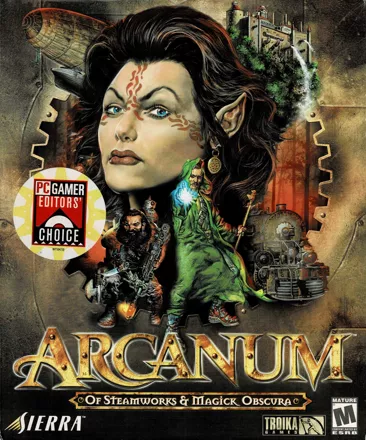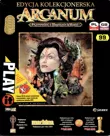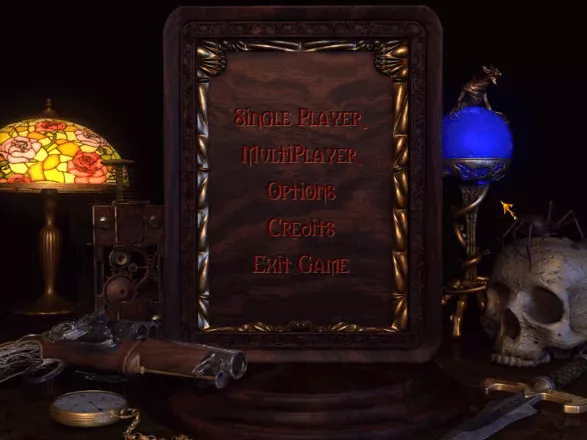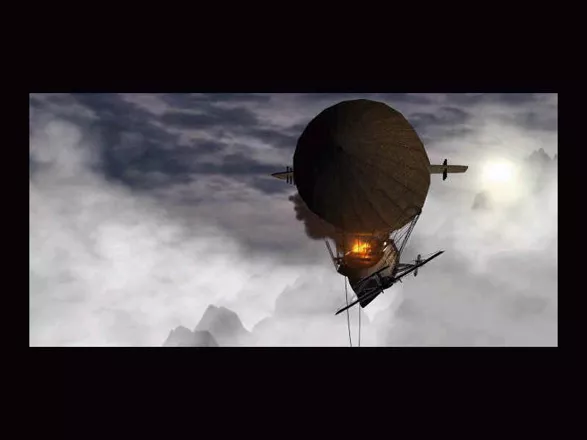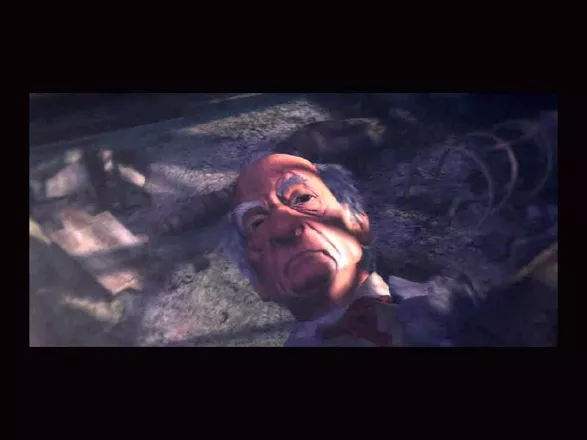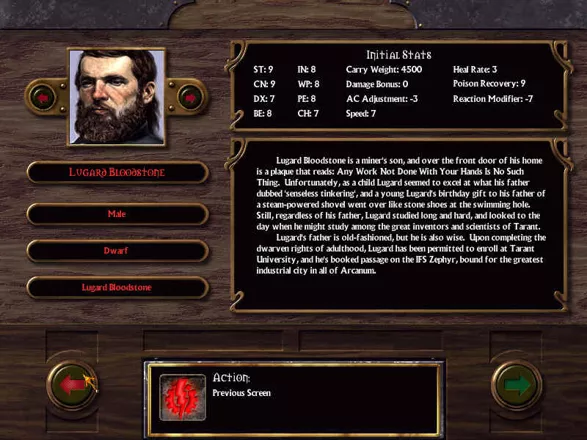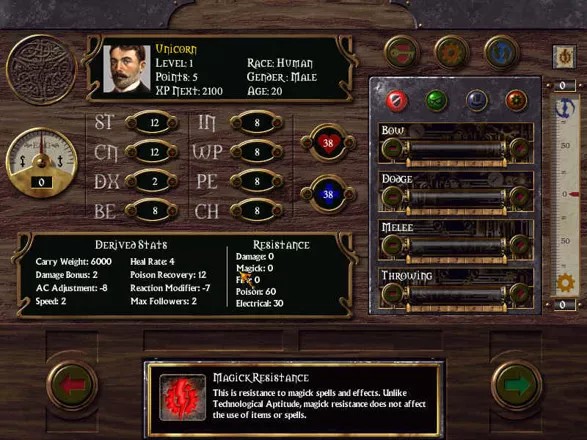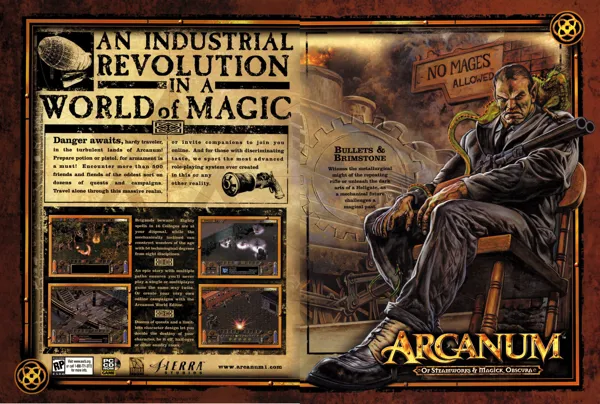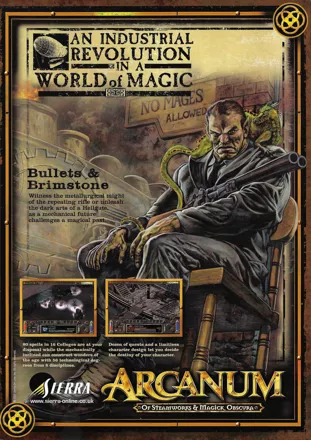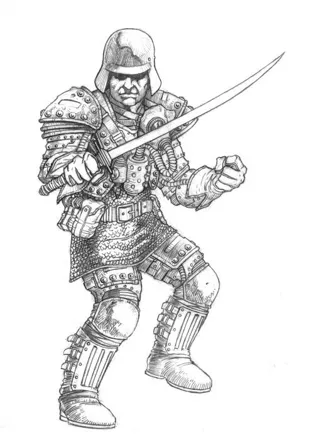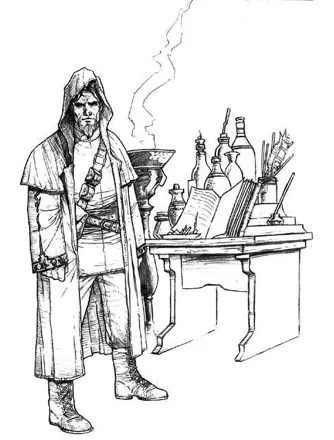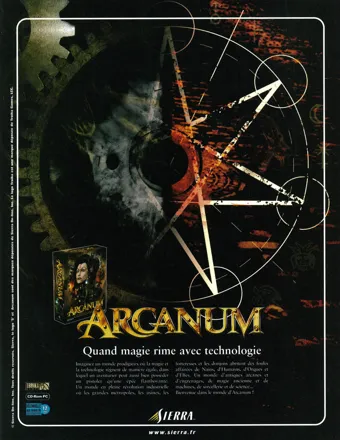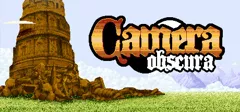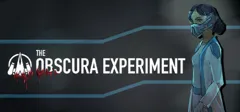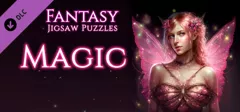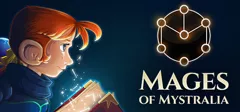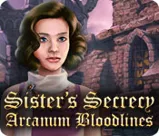Arcanum: Of Steamworks & Magick Obscura
Description official descriptions
The luxury zeppelin IFS Zephyr begins her maiden voyage from Caladon in the Kingdom of Arland to Tarant, one of the largest cities in the technologically advanced Unified Kingdom. Suddenly, while the zeppelin is cruising over mountains, two monoplanes attack it and eventually shoot it down. The two half-ogre attackers die in flames along with all their victims except two who miraculously survived. However, one of them, an old gnome, is mortally wounded. Just before he dies, he gives a silver ring to the other survivor and tells him to "find the boy". The witness of the crash, a man named Virgil, declares that the now only survivor is "The Living One", a reincarnation of a deity, and offers to follow him wherever he goes. The hero begins a long and perilous search for the mysterious boy, the origins of the silver ring, and the unknown enemy who was behind the attack on the zeppelin.
Arcanum is a role-playing game similar in concept and many gameplay principles to Fallout. It is set in a unique world, which can be described as mixture between Tolkienesque fantasy, steampunk technology and elements of British and North American culture of the 19th century: dwarves may carry molotov cocktails, and a half-orc protagonist can travel by train between Victorian-like cities. Magic and technology are opposed to each other; most humans and dwarves embrace technology, while some elf clans stick to the old ways and consider scientific progress evil.
In the beginning of the game the player creates the main character, choosing from a variety of races, attributes, magical or technological disciplines, social skills, backgrounds, etc. When the character levels up, the player can increase his main parameters as well as any available skills. Like in Fallout games, the player directly controls only one character; however, companions who join the party may be given orders, and their inventory can be managed by the player.
The game is open-ended: the player is free to explore the vast world from the onset, undertaking a large amount of side quests or following the main story. Social interaction plays a significant role: depending on the player character's charisma and intelligence attributes, as well as persuasion skill, many problems can be solved in a non-violent way. The amount of companions willing to follow the protagonist also depends on the latter's charisma rating; companions may also leave the party if they disagree with the hero's behavior.
The player can select one of the three combat modes for the game: real-time, turn-based, and fast-paced turn-based. Turn-based mode is similar to the combat in Fallout games: characters require action points to move, attack, or cast spells.
The game includes an editor called WorldEdit, which allows players to create their own maps, campaigns, and non-playable characters. Objects from the base game can be carried across to the player-created scenario. The scenery editor allows players to create their own objects. It is also possible to set and change game variables, i.e. the amount of skill points required to perform a specific task.
Spellings
- 奥秘:技术与魔法 - Chinese spelling (simplified)
Groups +
- BestSeller Series (Cendant / Havas / Vivendi Universal) releases
- Fantasy creatures: Dwarves
- Fantasy creatures: Elves
- Fantasy creatures: Gnomes
- Fantasy creatures: Halflings / Hobbits
- Fantasy creatures: Orcs
- Gameplay feature: Alchemy
- Gameplay feature: Brothels
- Gameplay feature: Character development - Skill distribution
- Gameplay feature: Gambling
- Gameplay feature: Karma meter
- Gameplay feature: Multiple endings
- Middleware: Bink Video
- Physical Bonus Content: World Map
- Protagonist: Female (option)
- Sound engine: AIL/Miles Sound System
Screenshots
Promos
Videos
Add Trailer or Gameplay Video +1 point
See any errors or missing info for this game?
You can submit a correction, contribute trivia, add to a game group, add a related site or alternate title.
Credits (Windows version)
157 People (118 developers, 39 thanks) · View all
| Project Leader | |
| Lead Programming | |
| Programming | |
| Design | |
| Animation | |
| [ full credits ] | |
Reviews
Critics
Average score: 79% (based on 61 ratings)
Players
Average score: 4.0 out of 5 (based on 168 ratings with 13 reviews)
Troika is dead, Long Live Troika
The Good
As was with Fallout 1+2, the gameplay was, by and by, the main attraction of this game. The options for character development are massive; they put the majority of other games on the market to shame. The character creation is simple (and full of easy ways to waste your points if you haven't played the game before, or haven't consulted a guide), but as the game progresses, the player is given a massive range of options for character development. One of the nicer points about this game is that it is impossible to even come close to mastering more then a handful of the wide range of skills and abilities, it makes replays of the game a completely different experience.
Also worth noting is the great Steampunk setting, that is integral to the story, and also allows for a huge range of environments and characters for the player to explore and interact with. The background graphics add to the atmosphere; your characters explore everything from a industrial revolutionized town, to ancient elven cities in trees.
The story in this game is also well done, but often is ignored for long stretches of time in lieu of exploration and sidequests.
The Bad
The character graphics were abysmal for their time; the animation was jerky, the detail was low, and, in addition to that, the style was weak and generic feeling.
The battle system is good, but flawed. It is very close to Fallout's system, just not as well planned out and executed. There is also a "real-time" setting that is worthless except for the easy battles, as it moves far far faster then the player is able to command his character.
Also, even with it's final patch, the game still has terrible crashes and will occasionally eat a save game.
The Bottom Line
A brilliant RPG that needed just a little bit more polish to have achieved true classic status.
Windows · by aiolos (4) · 2006
A fine, fun RPG in an original (at least in games) world.
The Good
This game generally fulfilled its vision of a new setting and story with the same sort of flexibility that worked for the Fallouts. The number of possible character choices and development paths is significantly greater and more diverse than in the earlier games. The interplay of magic and technology, and the different feel of each, is interesting. The evocation of a Victorian English feeling (with some more modern conspiracies below the surface) is particularly wonderful.
Perhaps most promising, the developers seem to have mostly grown up since Fallout2. The sophomoric "humor" is mostly replaced by more interesting and better developed characters. There are moral dilemmas and issues to think about. Many of the factions are drawn in moral grays instead of melodramatic monochrome.
Although some have complained about the "sexism" in the game, including both the lack of female art for two of the playable races (a production cost decision) and the inclusion of some gender discrimination in the world and character reactions (an integral part of the success in producing a Victorian flavor for the game world), I did not find the game particularly prejudiced, and in fact there is a strong subplot around issues of racism and racial exploitation.
The Bad
Not all characters are created equal - there were some balance issues.
One of the most interesting side quests was unfinished, and just leaves the player dangling.
The desire to make a "toolbox" game was not carried far enough to really catch on - in particular third-party adventures can't have a world map - but it was carried far enough to limit options for game scripting.
There were some annoying bugs in the UI even in the final patch.
Managing NPCs in your party was done well in general, but a technical character was not allowed to purchase items for magical followers and vice versa - shopkeepers refused to interact with opposite-aligned characters entirely.
The game was a slug on the best machines available when it shipped.
The Bottom Line
A fine, though not perfect, game and a landmark in CPRGs.
Windows · by weregamer (155) · 2003
Gnomes with guns and bits with bugs
The Good
Arcanum's setting is great. The blend of steampunk and fantasy is a welcome change from the Forgotten Realms or uninspired clones thereof that are all too often found in computer role-playing games. The setting goes far beyond just having gnomes with guns. It manages to capture a Victorian atmosphere and fuse it believably to its Tolkienesque world with a lot of attention to detail, from exploited orcish factory workers and a certain degree of racism towards orcs and half-orcs, including player characters, in general to mages not being allowed near locomotives out of fear of malfunctions, because the conflicting nature of magic and technology.
This conflict is also present in character generation, with a character that is strong in both magic and technology being just about the only thing you can't generate. Other than that you're pretty much free to do what you want. Like in Fallout, which was made by many of the same people, your character can be anything you want and the game is playable as almost everything as well. From stupid thieves to pacifistic chemists and from homicidal gunslingers to goody two shoes necromancers, anything goes. Many quests, including the main one, have more than one way to solve them, so the choice is really up to you, giving the game a lot of replay value.
The storyline is good, although it starts a bit slowly and even though is mainly linear, there are different paths and different endings depending on your choices along the way. The story will take you across the whole continent of Arcanum, from jungle islands to desert wastelands and from elven cities to dwarven caverns. All of these places are filled with side quests which range from simple delivery boy and assassination quests to elaborate conspiracies and political machinations. Still, there are entire villages that are completely optional, leaving much room for exploration. An interesting feature in this regard is that the whole world is like a huge canvas. If you keep on walking to the north east from Shrouded Hills, without going to the world map, you will eventually arrive at Tarant, just as if you'd traveled there via the world map. While doing this would be tedious and pointless, I appreciate that there's the possibility as it gives, to me at least, the whole world a sense of coherence as it doesn't just consist of isolated locations but also of the wilderness between them.
I also enjoyed how characters react to you differently, depending on your race, gender, reputation and technological or magical aptitude, even on some your equipment, like barbarian armor or a smoking jacket and that a character's equipment is reflected in both his graphics and his inventory. If you kill a servant, you'll be able to take and wear their uniform and if somebody attacks you wearing plate mail and wielding a broadsword, you will be able to take and use them as well after you defeat him. Assuming, of course, that the armor is your size, because small armor will only fit half-lings, dwarves and gnomes and elven chainmail is too small for half-ogres.
The Bad
However, just as most of Fallout's good aspects are present in this game, so are some of its not so good ones, unfortunately. First of all, there's the issue of bugs. The release version had lots of them and even after the final patch a couple of them remain. Mostly minor stuff, but annoying nonetheless and distracting from the game's otherwise great atmosphere. Also, the tile-based graphics are best described as functional. Streets are always at right angles and most buildings look exactly the same. There's little variety in the way dungeons look and most animations are wooden. Even special effects like spell animations aren't really spectacular. The graphics weren't state of the art when the game came out and certainly aren't now, but they get their job done.
Finally, there's one aspect that wasn't handled quite as well as in previous games and that's the combat. The game offers both a trendy real-time mode and a turn-based alternative. Unfortunately, neither works as well as those in other games. The real-time mode is not pausable and very hectic whereas the turn-based mode doesn't give you clear information how many action points each action is going to take. Additionally, real-time combat seems to favor ranged fighters whereas melee specialists seem to have the edge in the turn-based mode. Combat is arguably neither the focus of the game nor is it very hard as characters can get very powerful very quickly, but it's a pity it wasn't executed better.
The Bottom Line
Overall, the game is a worthy successor to Fallout and a true computer role-playing game. If you like role-playing games in general or Fallout in particular, this game is for you. If you like unusual settings in general or steampunk in particular, this game is also for you. However, if you like flashy graphics and lots of gunslinging action, you'll probably have to look elsewhere.
Windows · by Anym (165) · 2006
Discussion
| Subject | By | Date |
|---|---|---|
| [false alarm] glitch: no speech? | Rola (8483) | Oct 20, 2018 |
Trivia
Graveyards
A hidden graveyard, containing tombstones of Arcanum's most diehard fans, can be found at the location W: 1060 S : 809 on the world map. Another graveyard has lots of humorous epitaphs written on the graves. However, many of them are taken directly from Baldur's Gate.
Manual
Following on the tradition started in the Fallout manuals, Arcanum's manual includes an actual cooking recipe. This time it's Grandma Cookhill's Three Bowl Bread.
Mod pack
On 7 January 2002, the development team released a free mod pack, containing six new and exclusive adventures. It can be downloaded here.
Mods
Chris Beddoes has produced a mod for this game that addresses some balance issues, makes it overall a little more challenging, and replaces the entire opening area and quests. This latter is important because the opening area was used in the demo, and many players have just seen it too many times to want to start a new character any more, despite the near-infinite possibilities for character design. It can be found here.
References
- There's a location in the game called the "Isle of Despair" which is a penal colony which holds it's inmates in a remote island behind a magical barrier that makes it impossible to escape. Now, when asking the generic NPCs for its location, they answer:
"You mean the Black Isle? I'm not quite sure..."
Black Isle Studios is the name of Interplay's RPG division, and the former home of Arcanum's development team.
- A portion of the Stillwater giant quest contains a major (and fairly obvious) reference to Monty Python and the Holy Grail, specifically the part where you have to trace the beast to a cave and capture it. In fact, the whole sequence plays just like in the movie, you follow some giant footprints, enter a dark cave filled with bones and dead bodies, and so on.
- There's a Fallout reference in the walled city of Tulla. Apparently one of the students had to venture out in the Wastes to find a Water Gem. He has since returned and the Mages fear how the journey changed him and the influence he might have on other students. Plus, he's wearing mechanized armor.
- There's actually a reference to Bill Gates and Microsoft stealing the ideas for their Windows operating system from Apple's MacOS. One of the most influential and wealthy of people in Tarant is Gilbert Bates (Swap the G and B in Gill Bates and you have Bill Gates) because he brought the power of the steam engine to mankind. Another steam engine developer, called Cedric APPLEby is spiteful of Bates's success and claims that he invented the steam engine first and that Bates had stolen the idea off him.
Server shutdown
The official online servers were shut down on 1 November 2008.
Soundtrack
The soundtrack to Arcanum was composed by Ben Houge for string quartet and was provided in its entirety on Computer Gaming World's May 2001 demo CD.
Both the soundtrack and its sheet music are available as a free download.
Stillwater giant
Despite the result of the associated quest, the Stillwater giant DOES exist. It can be found on a random encounter between Stillwater and the pass to the elven city.
Information also contributed by Rambutaan, Sciere, Terrence Bosky, uclafalcon, Unicorn Lynx, weregamer, Wojit and Zovni
Analytics
Upgrade to MobyPro to view research rankings!
Related Sites +
-
Arcanum Walkthrough by Quandary
by Steve Metzler -
Developer's Site
Troika's Arcanum page -
Hints for Arcanum
Having trouble with Arcanum? These hints are arranged in question and answer form to help you solve it on your own. Includes complete solutions. -
Mike's Arcanum Resources
A really good Arcanum fan site with many things you can't find elsewhere. -
Official Arcanum Website
The Official Sierra: Arcanum Website (English) -
Official website (german)
Official website (german) -
Sierra: Arcanum - Soundtracks
The Arcanum soundtrack is officially available for download here! -
Terra Arcanum
Wonderful fansite with walkthrough and good gameplay hints.
Identifiers +
Contribute
Are you familiar with this game? Help document and preserve this entry in video game history! If your contribution is approved, you will earn points and be credited as a contributor.
Contributors to this Entry
Game added by Unicorn Lynx.
Additional contributors: Zovni, Kaliban, Indra was here, Jeanne, phlux, JRK, tbuteler, jsbrigo, Alaedrain, Patrick Bregger, Plok.
Game added August 25, 2001. Last modified April 5, 2024.
